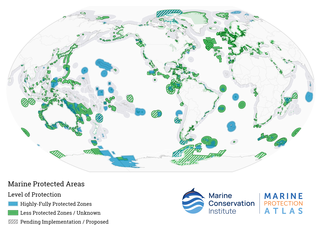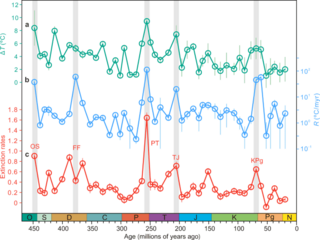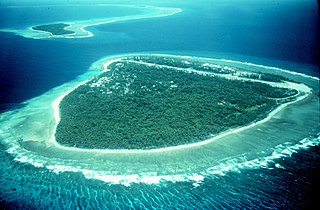
Marine biology is the scientific study of the biology of marine life, organisms in the sea. Given that in biology many phyla, families and genera have some species that live in the sea and others that live on land, marine biology classifies species based on the environment rather than on taxonomy.

The Great Barrier Reef is the world's largest coral reef system, composed of over 2,900 individual reefs and 900 islands stretching for over 2,300 kilometres (1,400 mi) over an area of approximately 344,400 square kilometres (133,000 sq mi). The reef is located in the Coral Sea, off the coast of Queensland, Australia, separated from the coast by a channel 160 kilometres (100 mi) wide in places and over 61 metres (200 ft) deep. The Great Barrier Reef can be seen from outer space and is the world's biggest single structure made by living organisms. This reef structure is composed of and built by billions of tiny organisms, known as coral polyps. It supports a wide diversity of life and was selected as a World Heritage Site in 1981. CNN labelled it one of the Seven Natural Wonders of the World in 1997. Australian World Heritage places included it in its list in 2007. The Queensland National Trust named it a state icon of Queensland in 2006.

A coral reef is an underwater ecosystem characterized by reef-building corals. Reefs are formed of colonies of coral polyps held together by calcium carbonate. Most coral reefs are built from stony corals, whose polyps cluster in groups.

Coral bleaching is the process when corals become white due to various stressors, such as changes in temperature, light, or nutrients. Bleaching occurs when coral polyps expel the zooxanthellae that live inside their tissue, causing the coral to turn white. The zooxanthellae are photosynthetic, and as the water temperature rises, they begin to produce reactive oxygen species. This is toxic to the coral, so the coral expels the zooxanthellae. Since the zooxanthellae produce the majority of coral colouration, the coral tissue becomes transparent, revealing the coral skeleton made of calcium carbonate. Most bleached corals appear bright white, but some are blue, yellow, or pink due to pigment proteins in the coral.

An artificial reef (AR) is a human-created freshwater or marine benthic structure. Typically built in areas with a generally featureless bottom to promote marine life, it may be intended to control erosion, protect coastal areas, block ship passage, block the use of trawling nets, support reef restoration, improve aquaculture, or enhance scuba diving and surfing. Early artificial reefs were built by the Persians and the Romans.

Marine protected areas (MPA) are protected areas of seas, oceans, estuaries or in the US, the Great Lakes. These marine areas can come in many forms ranging from wildlife refuges to research facilities. MPAs restrict human activity for a conservation purpose, typically to protect natural or cultural resources. Such marine resources are protected by local, state, territorial, native, regional, national, or international authorities and differ substantially among and between nations. This variation includes different limitations on development, fishing practices, fishing seasons and catch limits, moorings and bans on removing or disrupting marine life. In some situations, MPAs also provide revenue for countries, potentially equal to the income that they would have if they were to grant companies permissions to fish. The value of MPA to mobile species is unknown.

There are several plausible pathways that could lead to an increased extinction risk from climate change. This is because every plant and animal species has evolved to exist within a certain ecological niche, and as climate change represents the long-term alteration of temperature and average weather patterns, it can push climatic conditions outside of the species' niche, which will ultimately render it extinct. Normally, species faced with changing conditions can either adapt in place through microevolution or move to another habitat with suitable conditions. However, the speed of recent climate change is so unprecedented, that even under "mid-range" scenarios of future warming, only 5% of current ectotherm locations are within 50 km of a place which could serve as an equally suitable habitat at the end of this century.

Climate change has adversely affected terrestrial and marine ecosystems, including tundras, mangroves, coral reefs, and caves. Increasing global temperature, more frequent occurrence of extreme weather, and rising sea level are examples of the most impactful effects of climate change. Possible consequences of these effects include species decline and extinction and overall significant loss of biodiversity, change within ecosystems, increased prevalence of invasive species, loss of habitats, forests converting from carbon sinks to carbon sources, ocean acidification, disruption of the water cycle, increased occurrence and severity of natural disasters like wildfires and flooding, and lasting effects on species adaptation.

Human activities have substantial impact on coral reefs, contributing to their worldwide decline.[1] Damaging activities encompass coral mining, pollution, overfishing, blast fishing, as well as the excavation of canals and access points to islands and bays. Additional threats comprise disease, destructive fishing practices, and the warming of oceans.[2] Furthermore, the ocean's function as a carbon dioxide sink, alterations in the atmosphere, ultraviolet light, ocean acidification, viral infections, the repercussions of dust storms transporting agents to distant reefs, pollutants, and algal blooms represent some of the factors exerting influence on coral reefs. Importantly, the jeopardy faced by coral reefs extends far beyond coastal regions. The ramifications of climate change, notably global warming, induce an elevation in ocean temperatures that triggers coral bleaching—a potentially lethal phenomenon for coral ecosystems.

A Mesophotic coral reef or mesophotic coral ecosystem (MCE), originally from the Latin word meso (meaning middle) and photic (meaning light), is characterised by the presence of both light-dependent coral and algae, and organisms that can be found in water with low light penetration. Mesophotic Coral Ecosystem (MCEs) is a new, widely-adopted term used to refer to mesophotic coral reefs, as opposed to other similar terms like "deep coral reef communities" and "twilight zone", since those terms sometimes are confused due to their unclear, interchangeable nature.

Barbara Wienecke is a senior research scientist with the Australian Antarctic Division. She is a seabird ecologist who uses satellite tracking to investigate seabird population dynamics and ecology. Wienecke has played a key role in enhancing the quality of, and overseeing the implementation of, a number of Antarctic Specially Protected Area management plans for wildlife concentrations in East Antarctica.

An ecosystem, short for ecological system, is defined as a collection of interacting organisms within a biophysical environment. Ecosystems are never static, and are continually subject to stabilizing and destabilizing processes alike. Stabilizing processes allow ecosystems to adequately respond to destabilizing changes, or pertubations, in ecological conditions, or to recover from degradation induced by them: yet, if destabilizing processes become strong enough or fast enough to cross a critical threshold within that ecosystem, often described as an ecological 'tipping point', then an ecosystem collapse occurs.

Gretta T. Pecl is an Australian marine ecologist, Australian Research Council Future Fellow, and the Director of the Centre for Marine Socioecology (CMS) at the University of Tasmania. Her work focuses on species and ecosystem responses to climate change, as well as using socioecological approaches to adapt natural resource management for climate change. She is on the editorial board of Springer Nature's Reviews in Fish Biology and Fisheries, and is a Subject Editor for Ecography.
The Marine Ecosystem Assessment for the Southern Ocean (MEASO) is a project led by researchers at the Antarctic Climate & Ecosystems Cooperative Research Centre as a part of an international project of Integrating Climate and Ecosystem Dynamics (ICED).

Human activities affect marine life and marine habitats through overfishing, habitat loss, the introduction of invasive species, ocean pollution, ocean acidification and ocean warming. These impact marine ecosystems and food webs and may result in consequences as yet unrecognised for the biodiversity and continuation of marine life forms.

A marine heatwave is a period of abnormally high ocean temperatures relative to the average seasonal temperature in a particular marine region. Marine heatwaves are caused by a variety of factors, including shorter term weather phenomena such as fronts, intraseasonal, annual, or decadal modes like El Niño events, and longer term changes like climate change. Marine heatwaves can have biological impacts on ecosystems at individual, population, and community levels. MHWs have led to severe biodiversity changes such as coral bleaching, sea star wasting disease, harmful algal blooms, and mass mortality of benthic communities. Unlike heatwaves on land, marine heatwaves can extend for millions of square kilometers, persist for weeks to months or even years, and occur at subsurface levels.

Marine Permaculture is a form of mariculture that reflects the principles of permaculture by recreating seaweed forest habitat and other ecosystems in nearshore and offshore ocean environments. Doing so enables a sustainable long-term harvest of seaweeds and seafood, while regenerating life in the ocean.

A marine coastal ecosystem is a marine ecosystem which occurs where the land meets the ocean. Marine coastal ecosystems include many very different types of marine habitats, each with their own characteristics and species composition. They are characterized by high levels of biodiversity and productivity.
Elizabeth A. Fulton, also known as Beth Fulton, is an Australian ecosystem modeller, who was elected a Fellow of the Australian Academy of Science in 2022. She is a Research Group Leader at CSIRO Oceans & Atmosphere in Hobart, Tasmania.

















